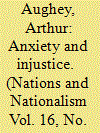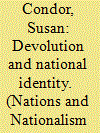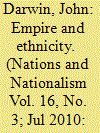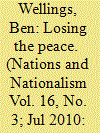|
|
|
Sort Order |
|
|
|
Items / Page
|
|
|
|
|
|
|
| Srl | Item |
| 1 |
ID:
098151


|
|
|
|
|
| Publication |
2010.
|
| Summary/Abstract |
An explicit and politically mobilised English nationalism has been remarkable because of its absence from deliberation on constitutional change in the United Kingdom. In short, it remains a mood and not a movement. This article explores the mood and explains why that mood has not become, as yet, a movement. It examines three related aspects of the English nationalist mood. First, it considers anxieties about the condition of contemporary England which can be found in the work of intellectuals and artists. Second, it identifies the sense of injustice which animates the lobby group the Campaign for an English Parliament. Finally, it looks at how mainstream party politics responds to these national anxieties and that sense of national injustice.
|
|
|
|
|
|
|
|
|
|
|
|
|
|
|
|
| 2 |
ID:
098145


|
|
|
|
|
| Publication |
2010.
|
| Summary/Abstract |
Outside parliament, the story of Afrikaner nationalism is largely a story of political (and sometimes economic) activists establishing language and cultural organisations. In a preliminary attempt to systematise the intentions and achievements of these extra-parliamentary components of the Afrikaner movement, this article critiques and refines Joep Leerssen's model of nationalism as 'the cultivation of culture' (Nations and Nationalism 12, 4: 559-78). Drawing on the examples of the Genootskap van Regte Afrikaanders and the Afrikaner-Broederbond, I revisit the relationship between cultural and political nationalism - both as concepts and as actual movements - and question the notion of a dichotomy.
|
|
|
|
|
|
|
|
|
|
|
|
|
|
|
|
| 3 |
ID:
098152


|
|
|
|
|
| Publication |
2010.
|
| Summary/Abstract |
In this article I consider why the expected English backlash to the asymmetric UK devolution settlement has not yet materialised. Using a corpus of conversational interviews, I discuss the various ways in which people in England currently understand the relationship between national identity and political entitlement. I conclude that English political quiescence, far from constituting an enigma, is comprehensible in the light of the fact that members of the general public do not usually base their assessments of political legitimacy on calculations of English national self-interest defined in contrast to Scotland. Rather, political issues tend to be judged with reference to principles of equity and procedural justice. English identity is rarely considered legitimate grounds for political voice. Rather, people are inclined to demonstrate a concern to balance the recognition of Scottish rights to national self-determination, with a display of public reason, civility and civic responsibility understood to be normatively incumbent upon the English majority.
|
|
|
|
|
|
|
|
|
|
|
|
|
|
|
|
| 4 |
ID:
098144


|
|
|
|
|
| Publication |
2010.
|
| Summary/Abstract |
Historians and social scientists have typically assumed a conflictual or exploitative relationship between empire and ethnicity. On the one hand, empire might be seen (as perhaps Ernest Gellner saw it in Nations and Nationalism) as a superstructure of coercion to which a group of ethnic units were subject. On the other (according to an influential view), empire fabricated ethnicities (tribes or castes) to divide and rule. This article suggests that both of these views are too crude. In the British case at least (and in the modern history of empire, no generalisation that excludes the British case has much value), 'imperial ethnicity' was a much more subtle phenomenon. It existed 'at home' as one element in a more complex identity. It was a powerful force in British settler societies, where an indigenous identity could not be imagined. And, perhaps surprisingly, it was deeply attractive to some colonial elites in Asia and Africa - at least for a time.
|
|
|
|
|
|
|
|
|
|
|
|
|
|
|
|
| 5 |
ID:
098148


|
|
|
| 6 |
ID:
098146


|
|
|
|
|
| Publication |
2010.
|
| Summary/Abstract |
Sub-state nationalist parties of the industrialised West occupy different positions along the left-right political spectrum. Despite the similarities of their political agendas, these parties adopt different ideological identities. This paper seeks to explain the choice of party position and the long-term consistency of these positions by employing a path-dependent perspective. The focus is first, on the critical junctures during which such choices are made; and second, on the mechanisms of continuity ensuring the persistence of the left-right identities. The argument is explored within the empirical context of Québécois nationalism.
|
|
|
|
|
|
|
|
|
|
|
|
|
|
|
|
| 7 |
ID:
098150


|
|
|
|
|
| Publication |
2010.
|
| Summary/Abstract |
Political resistance to European integration in the UK laid important ideological foundations for contemporary English nationalism. The politics surrounding accession to the European Economic Community (EEC) was such that it signalled that accession was a matter of supreme national importance and, via the device of a referendum, it led to the fusing of parliamentary and popular sovereignty. The unfolding of the Thatcherite project in Britain added an individualistic - and eventually an anti-European - dimension to this nascent English nationalism. Resistance to the deepening political and monetary integration of Europe, coupled with the effects of devolution in the UK, led to the emergence of a populist English nationalism, by now fundamentally shaped by opposition to European integration, albeit a nationalism that merged the defence of British and English sovereignty. Underpinning these three developments was a popular version of the past that saw 'Europe' as the ultimate institutional expression of British decline. Thus Euroscepeticism generated the ideology of contemporary English nationalism by legitimising the defence of parliamentary sovereignty through the invocation of popular sovereignty underpinned by reference to the past.
|
|
|
|
|
|
|
|
|
|
|
|
|
|
|
|
| 8 |
ID:
098149


|
|
|
|
|
| Publication |
2010.
|
| Summary/Abstract |
The current interest in Englishness and English national identity, spurred partly by parliamentary devolution to Scotland, Wales and Northern Ireland, has been accompanied by calls for an English parliament and even the promotion of a robust English nationalism. This article argues that this is a mistaken direction for the English. English traditions have been non-national and even supra-national. English identities have been especially bound up with Britain and Britishness. An England without Britain is hard to conceive, and would be impolitic to pursue. Survey evidence shows continuing Britishness among the English, with scant support for an English parliament or English independence. The expressions of English nationalism remain relatively muted. 'England for the English' is neither a realistic nor a sensible strategy.
|
|
|
|
|
|
|
|
|
|
|
|
|
|
|
|
| 9 |
ID:
098147


|
|
|
|
|
| Publication |
2010.
|
| Summary/Abstract |
This paper presents a comparative study of two key contenders for Serbian anthem-hood, the royalist song 'God of Justice' and the pan-Slavic hymn, 'Hey Slavs'. Drawing on the theorising of nation and representation, as developed by Benedict Anderson, Michael Billig and others, the purpose of the study is to compare the self-images these songs present to those they enjoin in unison, and to consider the role of those images and the identities they suggest in national/ist ideologies. Neither of the songs discussed in this paper was originally intended to be a national song. Both are in this sense 'accidental anthems'. The paper will discuss the history of the accidents which have at various times given, and deprived, these songs of anthem status, in Serbia. 'God of Justice', originally a song in a patriotic stage play of the 1870s (commissioned to legitimise a young prince's accession to the Serbian throne), was the national song and later the official national anthem of the Principality of (later Kingdom of) Serbia from 1872 to 1919 and then, in a changed form, part of the national anthem of the Kingdom of Yugoslavia from 1919 till 1941. It was resurrected in 2006, in a changed - republican - form to become the national anthem of the Republic of Serbia. The pan-Slavic 'Hey Slavs', written in 1842, emerged, a century later, first as a national song of the Communist-led resistance movement in Yugoslavia in 1942 and then became an unofficial national anthem of the Communist-ruled Yugoslav federation; it survived the violent disintegration of that federation in 1991 to serve (once again unofficially) as an anthem of the rump Yugoslavia from 1992 to 2006. Why have these particular songs been chosen for the purpose of representing the Serbian nation to itself and to the world? How has each succeeded and failed in that task? The essay concludes with some speculation on these questions.
|
|
|
|
|
|
|
|
|
|
|
|
|
|
|
|
|
|
|
|
|